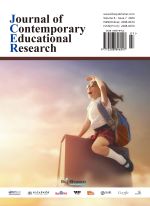Abstract
At present, the public is beginning to pay attention to education and the growth of young children, and inclusive education is gradually being valued by the public. Society needs to treat everyone equally, include all children, oppose discrimination and exclusion, and protect the right to education of children with special needs. By discovering and eliminating various learning obstacles, all children have more opportunities to participate in learning and realize the personalization of teaching models. The implementation of inclusive education in kindergartens can enable more children with special needs to adapt to and integrate into society. The article discusses the challenges faced by inclusive education in Chinese preschool under the perspective of inclusive education, in order to improve the quality of inclusive education and promote the healthy physical and mental development of children.
References
Carrington S, MacArthur J, 2012, Teaching in Inclusive School Communities, John Wiley & Sons Inc, Australia.
Pelatti CY, Dynia JM, Logan JA, et al., 2016, Examining Quality in Two Preschool Settings: Publicly Funded Early Childhood Education and Inclusive Early Childhood Education Classrooms. Child & Youth Care Forum, 45(6): 829–849.
UNESCO, 1994, The Salamanca Statement and Framework for Action on Special Needs Education, World Conference on Special Needs Education: Access and Quality, Salamanca, Spain.
UNESCO, 2000, The Dakar Framework for Action. Education for All: Meeting Our Collective Commitments, World Education Forum, Dakar.
Hu BY, Roberts SK, Wang Y, et al., 2011, The Initiation of Early Childhood Inclusion in China: A Case Study from Beijing. International Journal of Early Years Education, 19(2): 111–131.
Deng M, Zhu X, 2016, Special Education Reform Towards Inclusive Education: Blurring or Expanding Boundaries of Special and Regular Education in China. Journal of Research in Special Educational Needs, (16): 994–998.
Kenway J, 2013, Challenging Inequality in Australian Schools: Gonski and Beyond. Discourse: Studies in the Cultural Politics of Education, 34(2): 286–308.
Salend SJ, 2011, Creating Inclusive Classrooms: Effective and Reflective Practices (7th ed.), Pearson, Boston.
Armstrong D, 2006, Dreaming Our Future: Developing Democratic Professional Practice? Australian Educational Researcher, 33(3): 1–12.
Ainscow M, Booth T, Dyson A, 2006, Improving Schools, Developing Inclusion, Routledge, London.
Slee R, 2011, The Irregular School: Exclusion, Schools and Inclusive Education, Routledge, London.
Graham L, 2006, Done In By Discourse-Or The Problem/S With Labelling, in Schools and Diversity, Pearson Education, Australia, 33–52.
National People’s Congress, 2001, The Tenth Five-Year Plan, viewed April 20, 2011, http://www.npc.gov.cn/zgrdw/englishnpc/Special_11_5/2010-03/03/content_1690620.htm
